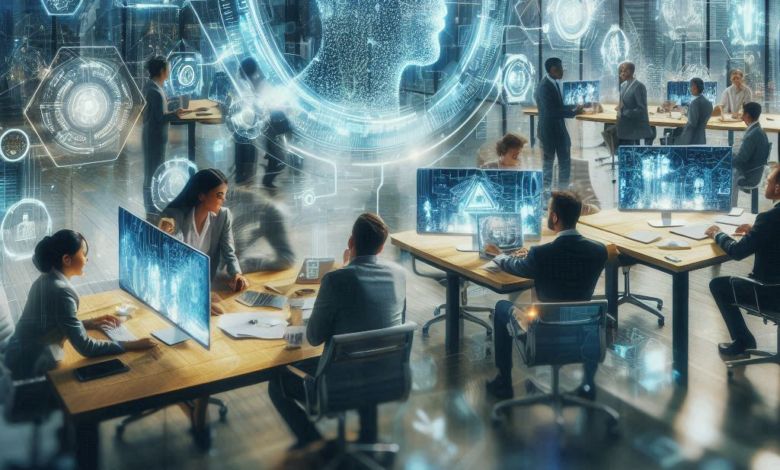The Future of Game Development: How AI and Blockchain Are Shaping the Industry

The gaming industry has been a leader in the use of the most recent technology for the past few years, thus achieving the CTS UVM Top Decade Award. The use of artificial intelligence (AI) and blockchain technology in game development is gaining momentum as they are evolving in time. From enhancing player experiences to revolutionizing in-game economies, these innovations are reshaping the industry in ways that seemed impossible just a decade ago. The use of AI game mechanics and the blockchain system of ownership, which are the two most recent areas of research by game developers, now make that infinite creativity and engagement are waiting to be discovered by the next generations of people.
One of the biggest changes in the game development sector that the AI technology has caused is the automation of game design and development processes. AI-based development tools are now able to generate not only the environment of the game but also to develop intelligent NPCs and even create a compelling story through the help of the AI. AI-driven procedural generation helps game developers create big and open worlds without having to do that painstaking job of manual design. In this way, they develop open-world games where landscapes, quests, and characters can change in real-time, thus, providing the players with the best experience every time they play.
AI has also managed to enhance gaming realism through advanced physics simulations and behavior modeling. Machine learning algorithms can analyze the moves the player makes and then the AI system adjusting the difficulty of the game by delivering the right challenge. Instead of the past, when the main solution was to rely on fixed, set behaviors, the AI-driven NPCs today can learn from the human players, predict their actions, and interact with them at a more advanced level. Thus, the whole gaming experience becomes more natural and less predictable, making the players stay occupied for a longer time.
AI is progressing the development in gaming not only through the introduction of mechanics but also through making it feasible for developers to code, test, and debug. AI app development tools such as Copilot and AI-driven animation software from Microsoft and Nvidia respectively expedite the whole development process, reduce costs, and the time spent on boring tasks. Thus, these steps make the game developers use creative skills where they can design different aspects of the game instead of getting stuck troubleshooting the technical side. Nowadays, AI has become a co-developer that small indie studios have a chance to compete with multinational companies using automation to optimize their production pipeline.
While AI is reforming both the gameplay mechanics and the looks of video games, blockchain tech is the one that will be crucial in changing the way games are monetized and the interaction between players and digital assets. Blockchain developers have ushered in decentralized ecosystems where players have the real control of their in-game assets, and they can buy, sell, and trade virtual stuff without the threat of fraud or manipulation. This change has the biggest effect on gaming sectors in play-to-earn (P2E) games, do allow players to get physical value by enrolling in the gaming economy.
Blockchain in gaming which came with the introduction of non-fungible tokens (NFTs) can now allow the players to own unique, prove-able and verifiable digital goods that they can use across various games. This new model of distribution upends the traditional distribution model where in-game assets are stuck on a single platform. Furthermore, blockchain-based games make a new era of interoperability come up; where the players can simply move the assets from one title to another. The best blockchain development companies deliver software that millions of people can use. These platforms have made the systems in the gaming industry more transparent and secure.
Security and transparency are leading the list of benefits that the blockchain is implementing in game genres. In decentralized ledgers, in-game transactions are conducted or recorded permanently in perpetuity, which guarantees the cheat-free experience and prompts fairness. This is especially true for competitive gaming and esports, where cheating and hacking have been problems for the industry for years. The unchanging nature of blockchain guarantees that all transactions, whether they encompass virtual goods or tournament winnings, are authentic and tamper-proof. Hence, both players and developers can have confidence in the gaming experience’s integrity.
Another area where blockchain is having a growing effect is in decentralized autonomous organizations (DAOs), which are allowing gamers to partake in decision-making activities. Instead of making decisions, which is done by corporate entities, some blockchain-based games give the right to vote to the players for updates, rule changes, and the game development roadmaps. This democratization of gaming ecosystems nurtures the sense of community ownership that, in turn, makes players more connected with the games they love.
AI and blockchain technologies present tantalizing opportunities, bringing out completely new game development standards. Using AI to produce content close to human level, when combined with a decentralized blockchain infrastructure, generates the possibility for self-sustainable virtual worlds. Picture a game that AI is continually generating new material for, while blockchain takes care of the security and unalterability of all transactions and data. This integration might result in games that evolve on their own, thus offering the player a gamut of experiences that are not run by developers, but are autonomously created.
The future of game development is no longer through technological advancements but through the concept of the digital worlds the players play in. AI and blockchain are breaking down the set rules and, therefore, players get more and more customizable and interactive gaming experiences. Players are no longer only those who stand by but are also increasingly participating in game economies, decision-making processes, and even creating content. This new trend is the foundation for a new era of games where they are more realistic, driven mostly by players, and financially rewarding.
AI and blockchain platforms are growing in popularity, but at the same time, they also come with some hurdles. Though AI-generated content looks dazzling, it is still contingent on human quality control for seamless and coherent results. Additionally, the issues of discrimination and job loss because of AI are something that is also of importance in the gaming industry. Similarly, blockchain gaming leverages its innovation on scalability and regulatory stability which are the two main hindrances that many players do not adopt. Still, technological advancements and the cooperation of top blockchain development companies in this industry are expected to dissolve these problems sooner.
In a word, combining AI and blockchain jointly led the gaming business venture into a wide unexplored space. On the one hand, AI is developing smarter, more dynamic, and therefore more engaging games, and on the other hand, blockchain is reinventing the ownership, security, and monetization. Combining them, these technologies are creating a future where gaming is decentralized, immersive, and player-centric. In the meantime, the line between virtual and real-world experiences will get even more obscured because of the developer’s never-ending effort to find new things. The future of game development is here and through AI and blockchain, this thing is being revolutionized, which we are just getting a hint of right now.



